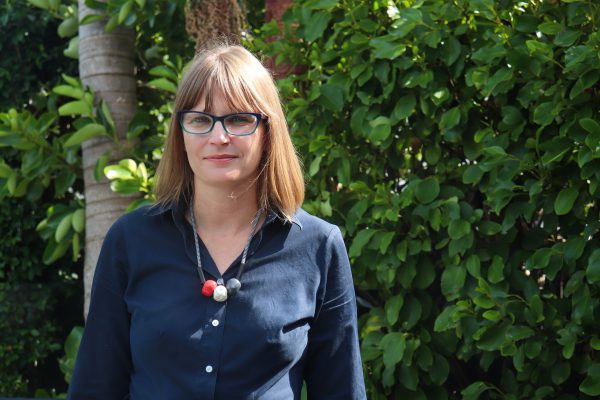5 December 2023
The Phoenix Prize recognises a University of Auckland Master of Creative Writing (MCW) manuscript of high quality with strong potential to succeed commercially.
The $3,500 prize, to be awarded annually for at least the next five years, was established thanks to the generosity of MCW alumni and aims to support the completion of the year’s most promising manuscript towards publication.
Winner Rachel Paris, who is new to creative writing after a 20-year career in law, says it’s a tremendous honour to receive the inaugural prize, as well as a huge shock.
“It means so much to receive this encouragement and validation after so much hard work, I’m absolutely thrilled.”
She says the Master of Creative Writing programme has been life changing.
During her masters year, Rachel wrote the first half of her debut novel The Unravelling, a thriller set in Sydney, which follows the downfall of the powerful Turner dynasty after the death of a child.
“It explores grief, guilt, toxic masculinity, and the redemptive power of forgiveness. Think Succession meets Sharp Objects,” she says.
“It’s been so invigorating to learn the craft from [programme director] Associate Professor Paula Morris, alongside such a talented and generous cohort of emerging writers; it was always my childhood dream to write, but I’d never had the confidence to share my work until I applied for the MCW. I’m so grateful that Caroline Barron, an author and MCW alum, encouraged me to apply, and that Paula took a chance and offered me a place on the programme.”
Rachel is now close to finishing the novel and hopes to have it out to agents and publishers in 2024 so she can get started on her next writing project.
Rose Carlyle, who also completed the MCW and is the bestselling author of Girl in the Mirror, was Rachel’s external examiner for her masters dissertation. She believes The Unravelling is “an extremely promising manuscript that showcases an excellent understanding of the thriller genre”.
“Rachel Paris’ characters are intriguing, her settings are beautifully evoked, and her story is pacy, unpredictable and absorbing. Most importantly to me, her writing style is excellent. I was impressed and entertained and am very hopeful of seeing this work in print in the near future.”
The prize criteria defines ‘commercial’ in the broadest sense, to include small, independent or university presses as well as multinationals, says Paula Morris, and will consider poetry, essays, stories, memoirs, novels and works of non-fiction.
Dr Morris named the prize after groundbreaking literary journal Phoenix, published by the Auckland University College Literary Society with students in 1932 and 1933, and which produced just four issues in its short but fruitful life.
“Phoenix reflected, developed, reviewed and interrogated an emerging and distinctive national literature. It was edited by James Bertram and then R.A.K. Mason and designed by Bob Lowry, an innovator in printing and typography, as well as Ron Holloway. Both Lowry and Holloway went on to start their own presses, and to become game-changers in New Zealand publishing.”
“Rachel Paris’ characters are intriguing, her settings are beautifully evoked, and her story is pacy, unpredictable and absorbing”.
She attributes its brief existence to it being “far too left-leaning” according to the University establishment of the day. “The tabloid newspaper Truth started complaining about Phoenix and Communist cells at the university, and that was the end of it.”
During its short life Phoenix published work by many emerging writers who went on to become significant national figures, including Charles Brasch, Allen Curnow, and A. R. D. Fairburn. The issues are held in the University of Auckland library archives, says Dr Morris.
“The editorial in the first issue declared: ‘Quite simply, it may be said that the Phoenix aims at giving intelligent people a place where they can write about the things that matter’. This is how I see the Master of Creative Writing today.
“I also see it as a gathering place for writers of all ages, many of whom are emerging voices, where they can develop skills, have discussions and disagreements, experiment with new genres and get substantial amounts of work done on a book.”





